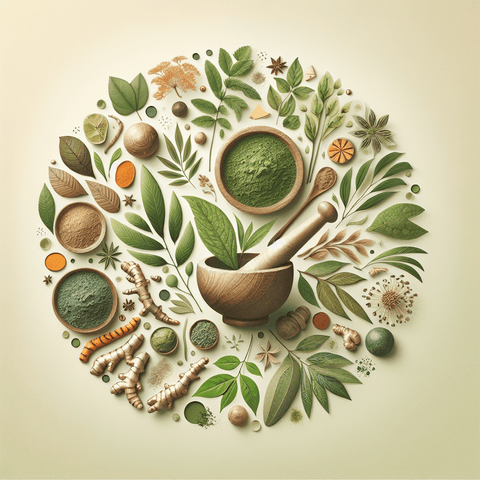Introduction
In recent years, the landscape of health and wellness has experienced a profound shift towards holistic approaches that prioritize natural, sustainable, and integrative methods of maintaining health. Among these, natural supplements have gained remarkable popularity, driven by a growing desire for alternatives that support the body's innate healing processes and overall vitality. As individuals become more conscious of what they consume, the understanding of nutritional support through natural means has become a cornerstone of holistic health strategies.
Despite their widespread use, it is essential to understand precisely what nutritional supplements entail, especially those derived from natural sources. This knowledge helps consumers make informed choices, avoids misconceptions, and fosters better health outcomes. Natural supplements are not just trendy add-ons; they are integral components that can enhance dietary intake, fill nutritional gaps, and support various bodily functions when used correctly.
The goal of this comprehensive guide is to delve into the multifaceted world of natural supplements—exploring their types, benefits, and the best practices for incorporation into a holistic wellness routine. Whether you're seeking to boost immunity, improve mental clarity, or manage stress, understanding the role of natural supplements is key to unlock a more vibrant, balanced life. Let’s embark on this journey to uncover the truth behind these potent wellness allies and learn how to harness their power safely and effectively.
Natural Supplements: An Essential Component of Nutritional Support for Holistic Wellness
Natural supplements encompass a broad spectrum of products derived directly from nature—plants, herbs, minerals, and other organic sources—that are used to complement diet and promote optimal health. Unlike synthetic supplements, which are created in laboratories, natural supplements are formulated from natural ingredients intending to preserve their intrinsic properties and bioavailability. They serve as essential elements in supporting holistic wellness by addressing nutritional deficiencies, enhancing bodily functions, and promoting overall vitality.
The scope of natural supplements includes vitamins, minerals, herbal extracts, plant-based powders, and other bioactive compounds. These aren’t merely alternative options but are integral to personalized health strategies that prioritize the body’s unique needs. For instance, herbal remedies like turmeric or ginseng offer therapeutic benefits that can support immune health, reduce inflammation, and boost energy levels. Similarly, plant-based supplements such as spirulina or moringa provide concentrated sources of antioxidants, vitamins, and minerals essential for maintaining health in a sustainable manner.
Understanding the difference between synthetic and natural nutritional supplements is crucial. Synthetic supplements are often chemically produced, and their efficacy can sometimes be limited by bioavailability issues. On the other hand, natural supplements tend to contain a complex matrix of compounds that work synergistically, offering a more holistic approach to nutrition. This complexity can enhance absorption and effectiveness, especially when the supplements are sourced responsibly and prepared with quality standards.
Furthermore, the increasing trust in natural supplements stems from their root in traditional medicine, scientific research supporting their use, and the desire for wholesome, chemical-free health solutions. People are recognizing that natural supplements can play a role in reducing the risk of nutritional deficiencies, supporting immune resilience, and maintaining systemic balance, ultimately contributing to a holistic approach that encompasses diet, lifestyle, and mental well-being.
By integrating natural supplements into their routines thoughtfully, individuals can foster a resilient, vibrant state of health—making them an essential component of supportive, holistic wellness practices.
Herbal Remedies: Nature’s Healing Power in Nutritional Formulations
Herbal remedies have been utilized for thousands of years in traditional medicinal systems worldwide. These natural formulations are rich sources of bioactive compounds that can support various aspects of health, making them a vital subgroup within the broader category of natural supplements. Today, herbal remedies are increasingly recognized by modern health enthusiasts as functional ingredients that can contribute to immune support, inflammation reduction, and enhanced vitality.
Among the most popular herbal supplements are turmeric, ginseng, echinacea, and—as some of the most studied—are renowned for their health-promoting properties. For example, turmeric contains curcumin, a compound known for its anti-inflammatory and antioxidant capabilities, which can support joint health and immune function. Ginseng, on the other hand, is celebrated for its adaptogenic properties, helping the body adapt to stress, improve mental alertness, and boost energy levels. Echinacea is frequently used to support immune health, especially during seasonal battles with colds and flu.
Herbal remedies contribute significantly to holistic health by supporting immune function, reducing systemic inflammation, and nurturing overall vitality. They are often used in combination with other supplements to create synergistic effects, emphasizing a comprehensive approach to health rather than isolated treatment. Scientific research continues to delve into these plants' compounds, confirming their roles in supporting bodily processes, though it remains essential to choose high-quality, standardized products to maximize benefits.
When selecting herbal supplements, consumers should prioritize products from reputable sources that adhere to strict manufacturing standards. Considerations include the extraction process, the concentration of active compounds, and transparency around sourcing. Also, consulting with a healthcare professional before starting herbal remedies is recommended, especially for individuals on medication or with underlying health conditions. By following these guidelines, users can safely enjoy the therapeutic qualities of herbs, confidently integrating them into their wellness routine for holistic support.
Holistic Health Boosters: Enhancing Wellbeing Beyond Basic Nutrition
Holistic health boosters are nutritional supplements designed to support multiple facets of well-being, extending beyond basic nutrition to include mental health, energy, and stress resilience. These holistic boosters are often formulated to work synergistically, creating a balanced approach to health that fosters resilience amidst modern stressors and lifestyle challenges.
Common examples include omega-3 fatty acids, probiotics, and adaptogenic herbs. Omega-3s—found abundantly in fish oils and certain plant sources—are vital for brain health, cardiovascular function, and reducing inflammation. Probiotics support gut health, which is increasingly recognized as central to overall wellness, immune function, and mental health. Adaptive herbs, such as ashwagandha and holy basil, help the body adapt to stress, promote mental clarity, and improve mood regulation.
The scientific community supports the use of these holistic health boosters due to their proven roles in reducing stress, supporting cognitive function, and contributing to emotional balance. For example, studies have shown that omega-3 supplements can play a role in improving mood and mental focus, while probiotics can enhance immune responses and gastrointestinal health. Integrating these supplements into daily routines can create a holistic foundation of wellness that addresses physical, mental, and emotional needs simultaneously.
Combining supplements thoughtfully increases their efficacy and supports the interconnected nature of holistic health. A personalized plan considers individual health goals, existing deficiencies, and lifestyle factors. For instance, someone dealing with high stress levels might incorporate adaptogens alongside omega-3s to increase resilience and mental clarity. A healthcare professional can help tailor these combinations effectively, ensuring safety and maximizing benefits.
Ultimately, holistic health boosters serve as vital tools for achieving vibrant living—helping individuals to navigate modern life's complexities with resilience, mental clarity, and physical vitality, reinforcing the essence of a comprehensive, natural wellness strategy.
Plant-Based Supplements: Harnessing the Power of Nature for Optimal Nutrition
Plant-based supplements have become increasingly popular in the realm of holistic wellness, offering a rich source of bioactive compounds that support health at a cellular level. Derived directly from plants or algae, these supplements deliver concentrated nutrients, antioxidants, and phytochemicals that align with eco-conscious, ethical values while promoting health naturally.
Some of the most widely used plant-based supplements include spirulina, chlorella, moringa, and matcha. Spirulina and chlorella are microalgae-packed with essential amino acids, chlorophyll, and antioxidants, supporting detoxification, immune health, and energy. Moringa is renowned for its high nutritive density, offering vitamins, minerals, and anti-inflammatory compounds. Matcha, a powdered green tea, provides a potent antioxidant boost along with gentle caffeine for sustained energy without jitters.
Benefits of plant-derived nutrients extend beyond health—these supplements are environmentally sustainable, often requiring fewer resources than animal-based products, and ethically harvested, ensuring minimal ecological impact. Their high antioxidant content helps combat oxidative stress, support skin health, and bolster immune defenses. Due to the high concentration of vitamins, minerals, and phytochemicals, integrating plant-based supplements into daily routines can significantly enhance overall well-being.
Guidance for integrating plant-based supplements involves starting with small doses, choosing high-quality products from reputable suppliers, and observing their effects over time. Incorporating powders into smoothies, using capsules as part of daily vitamins, or adding extracts to herbal teas are common practices. Combining these supplements with a balanced diet rich in fruits, vegetables, and whole grains optimizes their benefits and aligns with a holistic lifestyle.
By harnessing the power of plant-based supplements, individuals can enjoy a natural, ethical approach to achieving optimal nutrition, supporting their health while respecting the planet.
Natural Wellness Solutions: A Holistic Approach Using Nutritional Supplements
Holistic wellness transcends isolated supplementation; it involves a comprehensive, integrated approach that encompasses diet, lifestyle, mental health, and natural support systems. Nutritional supplements are but one part of this broader picture, acting as tools to detoxify, energize, and stabilize mood when used within a thoughtfully designed wellness strategy.
For instance, specific supplements support detoxification pathways—such as milk thistle for liver health—and energy enhancement through magnesium, which plays a role in over 300 enzymatic processes in the body. Mood regulation and cognitive clarity can be supported by adaptogens and B-vitamins, creating a foundation for resilience and mental sharpness. Vitamins, minerals, and herbal extracts are used synergistically to address individual health goals, resulting in personalized wellness plans.
In a holistic approach, the focus is not solely on supplement intake but also on lifestyle modifications: mindful eating, regular physical activity, quality sleep, and stress reduction techniques. Supplements are incorporated as part of this lifestyle, tailored to the person's specific needs through functional testing or professional guidance. This personalized strategy enhances the effectiveness of natural support and ensures sustainable health benefits.
Empowering oneself with knowledge about which nutrients and herbal allies best support one’s unique health profile allows for a proactive, balanced approach. It encourages mindfulness about the quality of supplements, energy levels, and mental health, fostering a resilient, vibrant life. When paired with lifestyle practices, natural wellness solutions become a powerful vehicle for long-term health and vitality, aligning with the principles of holistic health.
Alternative Health Supplements: Exploring New Avenues for Holistic Healing
Beyond mainstream nutritional supplements, alternative health options offer exciting avenues for holistic healing and wellness. These include medicinal mushrooms such as reishi and cordyceps, as well as colostrum and herbal adaptogens—each with unique properties that can support resilience, immunity, and recovery.
Medicinal mushrooms have been used in traditional medicine systems for centuries and are gaining scientific validation for their immune-modulating and adaptogenic qualities. Reishi, often called the "mushroom of immortality," is believed to support immune health, reduce fatigue, and promote relaxation. Cordyceps are valued for their ability to enhance athletic performance, energy, and stamina. Colostrum, the first milk produced after birth, is rich in immune factors and growth elements, supporting a healthy immune response and gut health.
While these supplements offer promising benefits, it’s important to consider quality and sourcing. Reputable providers ensure standardization of active compounds and transparency in processing. Proper evaluation of the product’s origin and manufacturing practices is necessary to avoid contaminants and ensure safety.
Integrating alternative health supplements should be done cautiously and ideally under professional guidance. They can complement a well-rounded, natural wellness routine, helping to address specific health concerns and promote resilience against stress, fatigue, or immune challenges. As with all supplements, balancing enthusiasm with evidence-based practice ensures safe and effective use in holistic health strategies.
Conclusion
In summary, natural nutritional supplements are vital allies in the pursuit of holistic wellness. From herbal remedies and plant-based supplements to holistic health boosters and alternative solutions, the spectrum of options offers a wealth of benefits supported by traditional wisdom and scientific research. These supplements can help fill nutritional gaps, support immune function, enhance energy levels, and promote emotional well-being when chosen wisely and integrated thoughtfully.
However, safety and personalization are paramount. Consulting healthcare professionals before starting any new supplement regimen ensures appropriate doses, compatibility with existing health conditions, and optimal outcomes. Embracing a balanced approach that combines high-quality natural supplements, a nourishing diet, physical activity, and mental health practices creates a sustainable foundation for holistic well-being.
Empower yourself with informed choices, knowing that natural supplements are tools—not magic solutions—but part of a broader, science-backed strategy for vibrant health. By understanding their roles and benefits, you can confidently navigate your health journey and unlock your full potential.
Q & A Section
Q: Are natural supplements safe to incorporate into my daily routine?
A: When sourced from reputable providers and used as directed, natural supplements are generally safe. However, it’s important to consult with a healthcare professional, particularly if you have existing health conditions or are taking medications, to ensure safety and appropriateness.
Q: How do I choose high-quality herbal or plant-based supplements?
A: Look for products from trusted brands that provide transparency about sourcing, ingredient standardization, and manufacturing practices. Certifications such as GMP or organic labels can also indicate quality. Personal research and consultation with healthcare providers can help select reputable products.
Q: Can I combine different types of supplements, such as herbal remedies and holistic health boosters?
A: Yes, but caution is advised. Combining supplements should be based on individual needs and professional guidance to avoid interactions and over-supplementation. Personalization and monitoring are key to maximizing benefits and safety.
Q: Do natural supplements replace a healthy diet and lifestyle?
A: No. Supplements are meant to support, not replace, a balanced diet and healthy lifestyle. They complement dietary and lifestyle choices to create a comprehensive approach to wellness.
Q: Are there any risks associated with alternative health supplements like medicinal mushrooms or colostrum?
A: While generally safe when sourced responsibly, some individuals may experience allergic reactions or interactions. It’s essential to verify quality, start with low doses, and seek professional advice if unsure.
Important Keywords
- Natural Supplements
- Holistic Wellness
- Herbal Remedies
- Plant-Based Supplements
- Health Boosters
- Alternative Health Supplements
- Immune Support
- Bioactive Compounds
- Organic Supplements
- Personalized Wellness
- Detoxification
- Energy Enhancement
- Mental Clarity
- Adaptogens
- Reishi Mushroom
- Colostrum
- Omega-3 Fatty Acids



